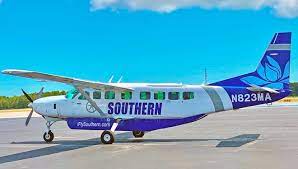![]()

The U-S Dept of Transportation has awarded Southern Airways Express a new 2-year Essential Air Service subsidy contract for flights between Chadron and Denver.
Southern is one of the largest commuter airlines in the country and has been serving Chadron since June 2021.
The new contract pays $3.559-million dollars the first year and $3.648-million the second year for 12 round trips a week on 9 passenger planes to Denver. That’s about $830,000 a year more than the current contract.
Southern Chief Commercial Officer Mark Cestari is excited to continue serving Chadron.
Southern offered the DOT two service options: one for the Cessna Caravan, the plane used most of the time under the current contract, and one for either the Pilatus PC-12, flown on the route by previous carrier Boutique Airlines, or the KingAir 200 that Southern has been trying to get into service since coming to Chadron.
The Caravan was about $450,000 a year less, but it doesn’t have a pressurized cabin while the other 2 do and the DOT felt the geography of the Chadron area creates weather conditions the pressurized planes can better avoid at multiple altitudes.
Chadron preferred the KingAir/Pilatus option, although without taking a formal position. Cestari thinks travelers will like the choice.
If circumstances force Southern to substitute the Caravan for a flight, the EAS subsidy for that flight would be half the rate.
Chadron is currently linked to Southern’s Denver-Pueblo route, resulting in the first Chadron flight a day going out later in the morning. Cestari thinks that as the airline adds more Denver routes, service to Chadron will continually improve.
Southern’s EAS contract is based on 6,750 passengers a year, 61% of capacity, with an average fare of $79.
The DOT has also approved a new EAS contract that keeps its current provider, KeyLime Air, which flies as the Denver Air Connection. It’s for $3.391-million the first year and $3.561 the second.
